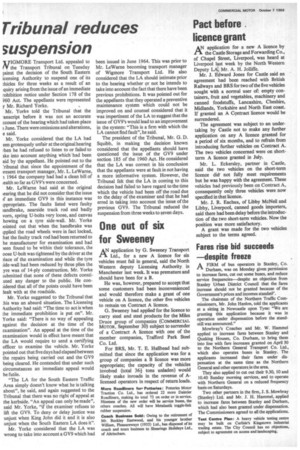Tribunal reduces suspension
Page 30

If you've noticed an error in this article please click here to report it so we can fix it.
VIGMORE Transport Ltd. appealed to the Transport Tribunal on Tuesday ;ainst the decision of the South Eastern icensing Authority to suspend one of its ;hicles for three weeks as a result of an quiry arising from the issue of an immediate ohibition notice under Section 178 of the )60 Act. The appellants were represented y Mr. Richard Yorke, Mr. Yorke told the Tribunal that the .anscript before it was not an accurate ccount of the hearing which had taken place June. There were omissions and alterations, e said.
Mr. Yorke considered that the LA had een grotesquely unfair at the original hearing then he had refused to listen to or failed to Ike into account anything which had been aid by the appellant. He pointed out to the 'ribunal that since the appointment of the iresent transport manager, Mr. L. LeWarne, 1964 the company had had a clean bill of Lealth so far as GV9's were concerned.
Mr. LeWarne had said at the original 'eating that he did not consider that the issue if an immediate GV9 in this instance was Lppropriate. The faults listed were faulty iandbrake, nearside track rod end badly vorn, spring U-bolts very loose, and canvas howing on a tyre side-wall. Mr. Yorke iointed out that when the handbrake was ?plied the road wheels were in fact locked, hat the faulty track rod had been returned to he manufacturer for examination and had yen found to be within their tolerance, the oose U-bolt was tightened by the driver at the )lace of the examination and while the tyre ide-wall had been reduced by three plies the yre was of 14-ply construction. Mr. Yorke iubmitted that none of these defects constiuted any danger to the public. He con;idered that all of the points could have been leak with at the roadside.
Mr. Yorke suggested to the Tribunal that his was an absurd situation. The Licensing Authority had said: "The time to act is when the immediate prohibition is put on". Mr. Yorke said: "There is no way of appealing against the decision at the time of the examination". An appeal at the time of the examination would in effect have meant that the LA would require to send a certifying officer to examine the vehicle. Mr. Yorke pointed out that five days had elapsed between the repairs being carried out and the GV9 being cleared. He contended that under such circumstances an immediate appeal would be futile.
"The LA for the South Eastern Traffic Area simply doesn't know what he is talking about", he said, and again suggested to the Tribunal that there was no right of appeal at the kerbside. "An appeal can only be made", said Mr. Yorke, "if the examiner refuses to lift the GV9. To deny or delay justice was unjust when King John did it and it is also unjust when the South Eastern LA does it".
Mr. Yorke considered that the LA was wrong to take into account a GV9 which had
been issued in June 1964. This was prior to Mr. LeWarne becoming transport manager of Wigmore Transport Ltd. He also considered that the LA should intimate prior to the hearing whether or not he intends to take into account the fact that there have been previous prohibitions. It was pointed out for the appellants that they operated a preventive maintenance system which could not be improved on and counsel considered that it was impertinent of the LA to suggest that the issue of GV9's would lead to an improvement in the system: "This is a firm with which the LA cannot find fault", he said.
The president of the Tribunal, Mr. G. D. Squibb, in making the decision known considered that the appellants should have questioned the issue of the GV9 under section 185 of the 1960 Act. He considered that the LA was correct in his conclusion that the appellants were at fault in not having a more informative system. However, the Tribunal felt that the LA in coming to this decision had failed to have regard to the time which the vehicle had been off the road due to the delay of the examiner and that he had erred in taking into account the issue of the previous GV9. The Tribunal reduced the suspension from three weeks to seven days.




















































































































